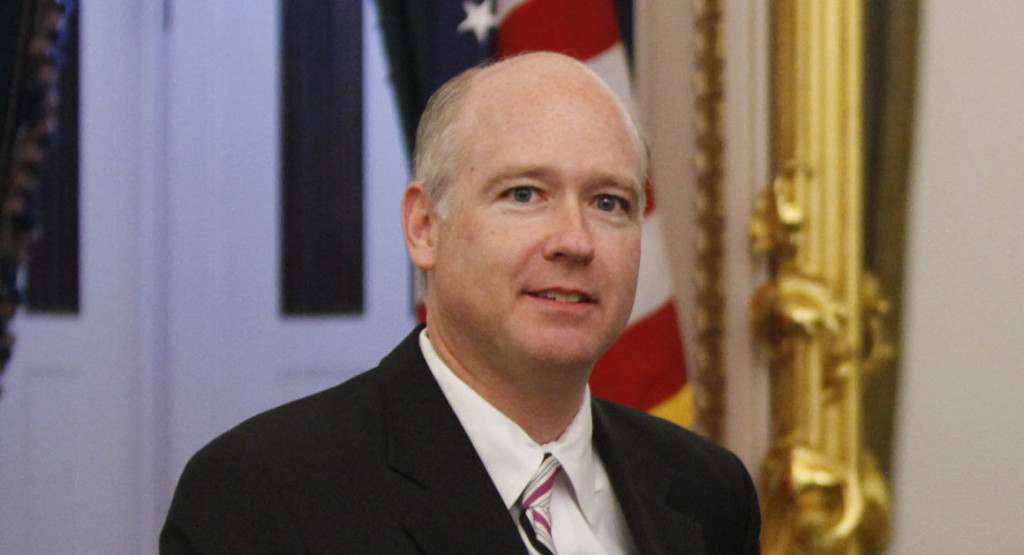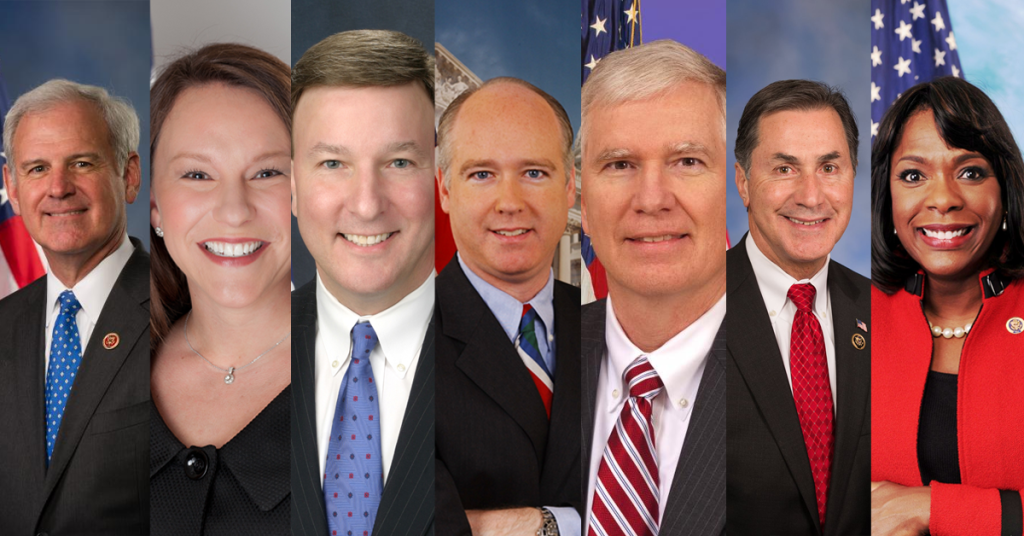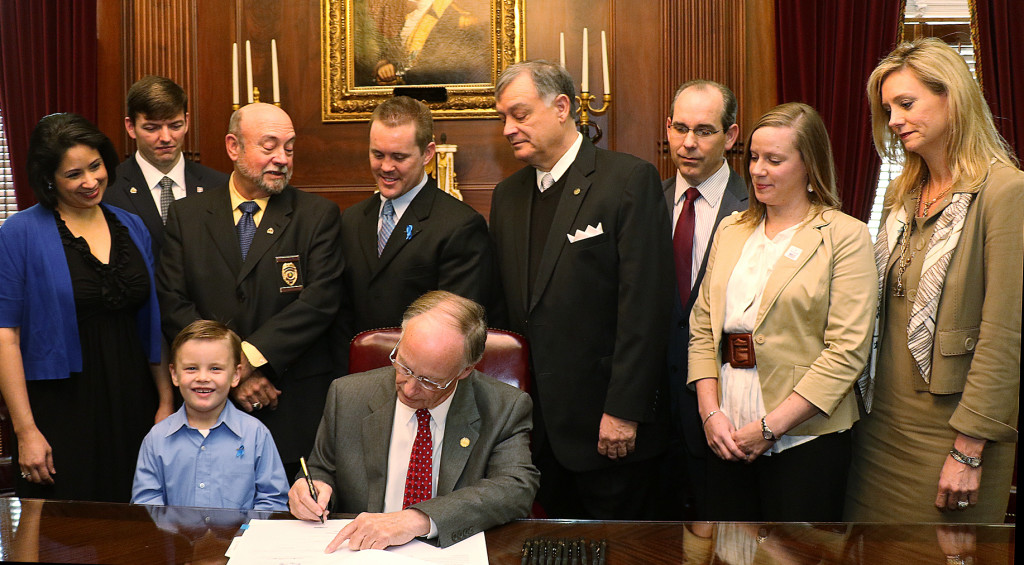Incumbent Richard Shelby easily wins Alabama primary over sea of challengers

Voters across the Yellowhammer State decisively re-elected Senator Richard Shelby (R-Ala.) to continue as their representative in the U.S. Senate . The race was called with Shelby leading by over 35 points. With 99 percent of Alabama’s precinct’s accounted for, his closest opponent former Marine Capt. Jonathan McConnell garnered only 28 percent of the vote to Shelby’s 65 percent, with all other challengers taking only about 8 percent of the vote. “I am honored that the people of Alabama have once again trusted me to be the Republican nominee for the United States Senate,” said Shelby following his victory. “Serving as your Senator is a privilege and responsibility that I do not take lightly, and I will continue to stand up against big government for all Alabamians and Americans.” Shelby continued, “Tonight’s victory would not be possible without the countless volunteers and supporters who worked to help me advance our conservative message across the state. I am grateful for each and every vote I received today, and I look forward to continuing the conservative fight in the General Election.” Shelby now moves to the General Election on November 8 and will take on Democratic victor Ron Crumpton.
J.T. Waggoner offers resolution to lift Cuban trade embargo

As the Senate session got underway Tuesday, Sen. J.T. Waggoner (R-Vestavia Hills) offered a resolution urging Congress to normalize relations with Cuba and lift the trade embargo which has been in place for more than 50 years. SJR43 claims that the embargo creates “significant restrictions and prohibitions on 20 American-Cuban relationships, notable on trade, travel, and 21 financial transactions.” Further, the resolution alleges that such restrictions make access to American goods “burdensome,” if not completely prohibited. As a result, Waggoner’s resolution suggests that the easing of restrictions against Cuba would create “new opportunities to grow our nation’s agricultural sector and create jobs in rural communities across the U.S.,” adding that Cuba is home to 11 million consumers, and in close proximity to the U.S., which makes it a “logical target for expanded U.S. food and agricultural exports.” The resolution further states that easing restrictions against the island would improve the quality of life for Cuban citizens and significantly boost the Cuban economy. Waggoner’s resolution is currently pending action in the Senate Rules Committee.
Donald Trump, Hillary Clinton claim big Super Tuesday victories

Republican Donald Trump and Democrat Hillary Clinton swept through the South on Super Tuesday, claiming victory in their parties’ primaries in delegate-rich Georgia, Tennessee, Alabama and Virginia. The front-runners appeared ever more likely to end up in a general election showdown. On the Republican side, Ted Cruz won his home state of Texas, the night’s single biggest prize, as well as neighboring Oklahoma. Democrat Bernie Sanders picked up a home-state win as well, in Vermont, and won in Oklahoma, too. Still, the night belonged to Trump and Clinton, who turned the busiest day of the 2016 primaries into a showcase of their strength with a wide swath of American voters. Signaling her confidence, Clinton set her sights on Trump as she addressed supporters during a victory rally. “It’s clear tonight that the stakes in this election have never been higher and the rhetoric we’re hearing on the other side has never been lower,” she said. Trump, too, had his eye on a general election match-up with the former secretary of state, casting her as part of a political establishment that has failed Americans. “She’s been there for so long,” Trump said at his swanky Mar-a-Lago resort in Florida. “If she hasn’t straightened it out by now, she’s not going to straighten it out in the next four years.” Trump’s dominance has rattled Republican leaders, who fear he’s unelectable against Clinton in November. Even as Trump professed to have good relationships with his party’s elite, he issued a warning to House Speaker Paul Ryan, who declared earlier in the day that “this party does not prey on people’s prejudices.” Trump said that if the two don’t get along, “he’s going to have to pay a big price.” But all efforts to stop him have failed, including an aggressive campaign by Florida Sen. Marco Rubio to discredit the billionaire businessman. For Rubio, Super Tuesday turned into a bitter disappointment. While many Republican officeholders have rallied around him in recent days, his first victory remained elusive. With an eye on Florida’s March 15 primary, Rubio vowed to keep up efforts to “unmask the true nature of the front-runner in this race.” With results still coming in, Trump had won at least 139 Super Tuesday delegates, while Cruz picked up at least 52. Overall, Trump leads the Republican field with 221 delegates. Sanders’ wins did little to help him make up ground in his delegate race with Clinton. She was assured of winning at least 334 of the 865 at stake on Super Tuesday. That’s compared to Sanders, who has at least 145 delegates. Tuesday marked the busiest day of the 2016 primaries, with the biggest single-day delegate haul up for grabs. Democrats voted in 11 states and American Samoa, with 865 delegates at stake. Republicans voted in 11 states, with 595 delegates. Clinton also picked up wins in Arkansas, and Texas, while Trump carried the GOP contests in Arkansas and Massachusetts. Cruz desperately needed his win in Texas in order to stay in the race, and was likely to keep campaigning as the only Republican who has been able to defeat Trump in any primary contest. Still, Trump’s wins in the South were a blow to Cruz, who once saw the region as his opportunity to stake a claim to the nomination. Instead, he’s watched Trump, a brash New York real estate mogul, display surprising strength with evangelical Christians and social conservatives. Republicans spent months largely letting Trump go unchallenged, wrongly assuming that his populist appeal with voters would fizzle. Instead, he’s appeared to only grow stronger, winning states and drawing broad support for some of his most controversial proposals. In six of the states on Tuesday, large majorities of Republican voters said they supported a proposal to temporarily ban all non-citizen Muslims from entering the United States, an idea championed by Trump. Nine in 10 of Trump’s voters were looking for an outsider, and half were angry with the government, according to exit polls conducted by Edison Research for The Associated Press and television networks. In the Democratic race, Clinton has steadied herself after an unexpectedly strong early challenge from Sanders. The Vermont senator did carry his home state decisively, and told the crowd at a raucous victory party that he was “so proud to bring Vermont values all across this country.” Sanders, who has energized supporters with his calls for a “political revolution,” has struggled to expand his base beyond young people and liberals. His weakness with black voters, a core part of the Democratic constituency, was underscored anew. Clinton was supported by at least 80 percent of black voters in Alabama, Arkansas, Virginia, Georgia, Tennessee and Texas. She was also bolstered by women and older voters. More than 90 percent of Clinton’s voters wanted an insider, according to exit polls, and nearly half said experience was the top quality they were looking for in a candidate. Republished with permission from the Associated Press.
Robert Aderholt wins 4th District primary, looks on to eleventh congressional term

Congressman Robert Aderholt (AL-04) defeated opponent Phil Norris Tuesday night securing the Republican nomination for representative of Alabama’s 4th Congressional District, moving one step closer to his eleventh term in office. According to his spokesperson Carson Clark, Aderholt celebrated his victory with Tuscaloosa County Republicans at Chuck’s Fish in Tuscaloosa. First elected to the U.S. House of Representatives in 1996, Aderholt received 102,348 votes, 81 percent, with 100 percent of precincts reporting. His challenger Norris received 23,343 votes, 18 percent, with 100 percent of precincts reporting. The 4th District includes most of Tuscaloosa, as well as the far northern suburbs of Birmingham and the southern suburbs of Huntsville and Decatur.
In Alabama congressional races, incumbents stay safe

Despite incessant worrying over what Donald Trump-anti-incumbent-fueled voter turnout would mean at the polls, all members of the Alabama congressional delegation managed to hold on to their seats in Tuesday’s primary election. U.S. Senate Republican Richard Shelby, who was first elected to the Senate in 1986, faced challenges from four Republican opponents. With 100 percent of precincts reporting, Shelby won by over 35 points. His closest opponent former Marine Capt. Jonathan McConnell garnered only 28 percent of the vote to Shelby’s 65 percent, with all other challengers taking only about 8 percent of the vote. On the Democratic side, business owner Shadrack McGill, who served in the state Senate from 2010 and 2014, and challengers John Martin, Marcus Bowman and Ron Crumpton faced off also in hopes of unseating Shelby, with Crumpton taking home the Democratic nomination, winning 56 percent of the vote. U.S. House of Representatives AL-01 Former state senator U.S. Rep. Bradley Byrne secured his first full term in office after defeating challenger Dean Young. Byrne, first elected to Congress in a special election in 2013, took home 60 percent of the vote, with 100 percent of precincts reporting. AL-02 Former Montgomery City Council member and three-term Congresswoman, U.S. Rep. Martha Roby defeated Wetumpka Tea Party founder Becky Gerritson to represent the 2nd District, which includes much of Montgomery and southeast Alabama. Roby won slightly more than 66 percent of the vote, meanwhile Gerritson took home only 27 percent of the vote, and Bob Rogers just over 5 percent. AL-03 First elected to the House in 2003, former Calhoun County commissioner U.S. Rep. Mike Rogers defeated longtime Auburn public school administrator Larry DiChiara to represent the 3rd District, which covers east-central Alabama. Rogers won 76 percent of the vote to DiChiara 24 percent. Standing between Rogers and his eighth term in Congress is Jesse Smith. Smith, a Phenix City native, was was unchallenged for the Democratic nomination. AL-04 Congressman Robert Aderholt (AL-04) defeated opponent Phil Norris the Republican nomination for representative of Alabama’s 4th Congressional District, moving one step closer to his eleventh term in office. First elected to the U.S. House of Representatives in 1996, Aderholt received 102,348 votes, 81 percent, with 100 percent of precincts reporting. AL-05 Third term Congressman Rep. Mo Brooks, who represents Alabama’s 5th District — encompassing the counties of Lauderdale, Limestone, Madison, Morgan and most of Jackson — was un-opposed. AL-06 Co-founder and former longtime president of the Alabama Policy Institute, U.S. Congressman Gary Palmer, was un-opposed. Palmer is Alabama’s newest Congressman and first elected in 2014 to represent portions of Birmingham, nearly all of Jefferson County outside of Birmingham, and the entirety of Bibb, Blount, Chilton, Colbert, Coosa and Shelby counties. AL-07 Alabama’s lone Democratic representative, Terri Sewell, who assumed office in 2011 was un-opposed. Her district encompasses portions of Birmingham,Tuscaloosa and Montgomery.
Twinkle Cavanaugh defeats Terry Dunn, retains commission post

Twinkle Cavanaugh will keep her post as President of Alabama’s utility-regulating Public Service Commission after winning the race Tuesday against challenger Terry Dunn. First elected in 2012, Cavanaugh received 431,085 votes, 63 percent, with 100 percent of precincts reporting. Meanwhile Dunn, who served on the commission from 2010 to 2014, received253,056 votes, roughly 37 percent.
Early polling results indicate big wins for incumbents

8:15 p.m – With polls having closed just a little over an hour ago, election results from the Secretary of State’s website indicate that incumbents will likely hold on to their seats in the U.S. Senate and House of Representatives. Though only nine of Alabama’s 67 counties are currently reporting, Sen. Richard Shelby is keeping a strangle hold on his seat. Of 6,017 ballots cast thus far, Shelby has collected a dominant 4,248, or 70.6 percent. His closest opposition is newcomer Jonathan McConnell, who has collected 1,294 votes, or 21.5 percent. On the Democratic side, Charles Nana is currently leading Ron Crumpton by more than 14 percentage points. Neither Democrat has made much of a showing leading up to today’s elections, but it had seemed that Crumpton would be leading the race. In much the same fashion, Rep. Martha Roby is leading Wetumpka Tea Party founder Becky Gerritson in the U.S. House District 2 race , with 74.48 percent of the vote compared to Gerritson’s 20.28 percent. Likewise, Reps. Bradley Byrne and Mo Brooks, U.S. House Districts 1 and 3 respectively, are trouncing their opponents by wide margins – in Rogers’ case, nearly 50 percentage points. Rep. Robert Aderholdt is also dominating his opponent with 82 percent of the vote in the U.S. House District 4 race.
Hillary Clinton wins Va. & Ga.; Bernie Sanders wins Vermont

Hillary Clinton wins the Democratic presidential primaries in Virginia and Georgia, while Bernie Sanders wins in his home state of Vermont. According to early results of the exit poll conducted by Edison Research for the Associated Press and Television Networks, Clinton led in both Virginia and Georgia among both men and women. Sanders led among voters under 30 and Clinton held a commanding lead among those 45 and over. In Vermont, Bernie Sanders was supported by overwhelming majorities of both men and women, and huge majorities of voters across all age groups. Half of Vermont Democrats said they want the next president’s policies to be more liberal than those of President Barack Obama. Republished with permission from the Associated Press.
Del Marsh files PREP Act to evaluate K-12 teachers and principals

Senate Pro Tem Del Marsh (R-Anniston) announced the Preparing and Rewarding Education Professionals (PREP) Act today, which would reform the process by which K-12 teachers and principals are evaluated based on the performance of their students. The process for evaluating these education professionals would include would include student surveys, two classroom observations and student achievement growth. Local school districts will be left to decide how much weight is given to each evaluation, though student achievement growth must be worth a minimum of 25 percent. Teachers would be ranked on a five-level scale based on their evaluations – Significantly Exceeds Expectations, Exceeds Expectations, Satisfies Expectations, Below Expectations and Significantly Below Expectations. Additional money will be provided for teachers willing to teach in rural or failing schools in order to combat the “growing shortage of qualified teachers” in the state. Further, money will be set aside for teacher mentoring programs and to create a committee of teachers who would advise legislators on ways to implement future changes to the legislation. While the PREP Act would not eliminate tenure, it would create a five-year track to tenure. If two evaluations find a teacher to be below expectations, the teacher could lose tenure or be directed to mandatory professional development. “This bill shows a commitment to the education professionals in Alabama,” Marsh said in a press release. “Over the past year we have worked with anyone who would be impacted by this bill, including classroom teachers themselves, and I believe this piece of legislation reflects input from all those involved. Since 2013, this legislature has been reform minded when it comes to education policy. As a state we have made progress, but obviously there is still work to be done to ensure that our children receive the world class education that will give them an advantage in the increasingly competitive and globally based job market.”
Robert Bentley signs ‘Winston’s Law’

In a signing ceremony Tuesday afternoon, Gov. Robert Bentley signed his name to “Winston’s Law” as the bill’s namesake looked on. SB23, sponsored by Sen. Clyde Chambliss (R-Prattville) and carried in the House by Rep. Paul Beckman (R-Prattville), makes aggravated child abuse a Class A felony for children under six. The crime now carries a potential punishment of life in prison and a $60,000 fine. The bill’s name comes from an Elmore County boy whose mother was indicted for charges of chemical endangerment of a child and aggravated child abuse. During committee hearings on the bill, testimony was given that the boys injuries were so severe that pictures could not be shared with the press or the public. During the signing ceremony, Bentley joked and teased the boy and presented him with one of the pens used in signing the legislation. Further, Bentley noted that he was signing the actual bill – a departure from other ceremonies where bill copies have been used. On hand for the ceremony were Chambliss, Beckman and a host of child activists and family members. “This is a good bill,” Bentley said, thanking lawmakers for drafting the legislation. “This is an important issue dealing with the protection of our children.” Before the signing of “Winston’s Law,” prosecutors were only able to charge child abusers with lesser crimes, often resulting in a punishment not strict enough for the crime. With this legislation, prosecutors will be able to seek maximum penalties for the most vicious abusers. A second bill dealing with child abuse penalties, “Ava’s Law,” which strengthens penalties for offenders whose abuse results in the death of a child, was passed by the legislature last week.
Dick Brewbaker uses floor time to condemn recent standardized test scores

Sen. Dick Brewbaker (R-Montgomery) took to the Senate floor Tuesday to chastise lawmakers and education officials for the recent National Assessment for Educational Progress (NAEP) scores, which lists Alabama fourth and eighth graders as 51st in the nation for reading and math scores. Brewbaker called for a “Point of Personal Privilege” to discuss the scores, noting that for eighth grade math only 23 percent of white students and 8 percent of black students met standards. “We are dead last,” Brewbaker said. “We are at the point now where it’s not just a bad school system, we are to the point now where we are crippling children for the rest of their lives.” Brewbaker noted that many of Alabama’s students going to college are in need of remedial courses and called on those in charge to take responsibility for those failures. Brewbaker further added that, at the end of this Legislative Session, he will resign his chairmanship on the Senate Committee on Education and said it was a good thing that State School Superintendent Tommy Bice announced his retirement Tuesday. “At some point we have got to take responsibility for what’s going on in our schools,” Brewbaker said. “We are serving up our children a poisonous meal from which they will never recover.” At the end of his remarks, Brewbaker received a thunderous round of applause from his fellow Senators, many rising to their feet in support of his remarks.
Emotional debate accompanies discussion of custody bill

The House Judiciary Committee met for a public hearing Tuesday regarding SB333, a bill from Sen. Mike Jones (R-Andalusia) that would redefine language related to parental custody in an effort to move away from the concept that one parent has sole physical custody. The bill is aimed at encouraging judges to more equitably arrange parental custody, preferably a 50/50 split between both parties, and allow for the joint creation of a parenting plan. “Co-parenting is becoming more and more the norm,” Jones said. “Families are different and we’ve got to come up with different kinds of plans.” Several people were lined up to speak for and against the legislation, the first Ray Maloy, a father of two who said he’s nearly gone bankrupt fighting his ex-wife’s pursuit of sole custody. Maloy hasn’t seen his children in about eight years, he said. Maloy contended the bill has “no teeth” and although it purports to advocate for split parenting rights, includes no language urging judges to seek to that goal. Another emotional testimony was given by Tina Grosch, a Lauderdale County mother whose parental rights were taken away on “unsubstantiated” charges. As a result, Grosch was allowed to see her children only at visitation centers, which cost her $30 an hour, under the supervision of counselors that have since been charged with fraud. “In my mind, visitation is for criminals,” Grosch said. “I get less visitation with my children than felons in our state prisons.” Perhaps the most stirring plea against the bill came from Crenshaw County lawyer Melissa Isaac, who represents fathers in divorce battles. According to Isaac, it would be easy to prove that a widespread bias against fathers exists in family courts. “Children do best when their relationship with both parents is preserved,” Isaac said. “If both parents are fit parents then there is no reason dad can’t have equal time as mom. Let’s start from a place of equality.” Phillip Lisenby, a family court judge from Northport, supported the bill on the grounds that it maintains the discretion of judges in deciding what is best for a child. “I see this as a step forward,” Lisenby said. “I see this bill as merely an expression of our Legislature to say we want to encourage joint custody.” No vote was taken on the measure and it will appear before the committee again next week.

